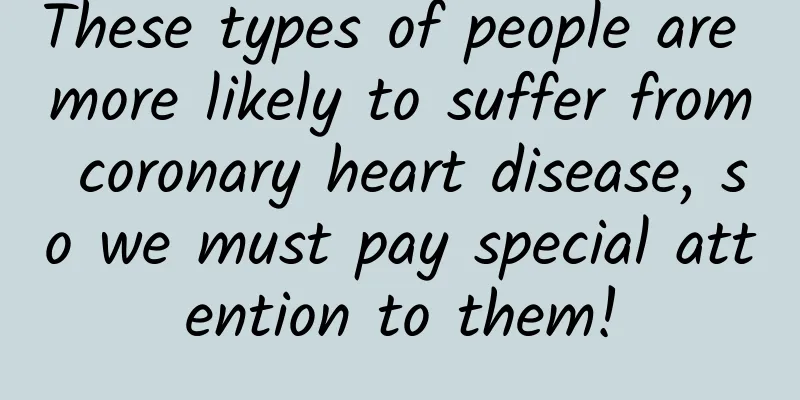These types of people are more likely to suffer from coronary heart disease, so we must pay special attention to them!

|
Author: Zhang Jianjun, Chief Physician, Beijing Chaoyang Hospital, Capital Medical University Reviewer: Wang Fang, Chief Physician, Beijing Hospital Why do some people get coronary heart disease and some don't? Some people get it early, some get it late? Some people have severe cases, some have mild ones? There must be a reason for this. 1. Is coronary heart disease related to genetics? Genetics is an important factor in coronary heart disease. For example, if the elders in the family, such as parents, have coronary heart disease, then the children will have a higher tendency to develop coronary heart disease. This is called family genetic tendency. That is to say, under the same conditions, people with a family history are more likely to develop coronary heart disease, and the time of developing coronary heart disease may be earlier. For example, if the father develops coronary heart disease at the age of 50, then the age at which the child develops coronary heart disease may be advanced to 40 years old. 2. Is coronary heart disease related to smoking, three highs, and sitting for long periods of time? Smoking, high blood sugar, high blood pressure, high blood lipids, sitting for long periods of time, lack of exercise, frequent anxiety, mental stress, etc. are all risk factors for coronary heart disease and will increase the tendency to coronary heart disease. Figure 1 Original copyright image, no permission to reprint Because these factors persist in the body for a long time, they can induce lipid deposition in blood vessels and lead to atherosclerosis. Of course, if there is this genetic tendency in the family, under the same conditions, it is more likely to form plaques and cause coronary heart disease. 3. Are all people with three highs prone to coronary heart disease? The three highs are risk factors for coronary heart disease. If the three highs exist at the same time, the incidence of coronary heart disease will be very, very high. However, after suffering from the "three highs", some patients control the risk factors early, their blood sugar, blood pressure, and blood lipids are very stable, and bad living habits are also corrected, then the incidence of coronary heart disease may be relatively low. Even if some people have three highs, but the elevation is mild, for example, blood sugar, blood lipids, and blood pressure are always slightly elevated rather than severely elevated, then the probability of them developing coronary heart disease may not be very high. Of course, if diabetes, hypertension, and hyperlipidemia are not well controlled, and are very severe and persist for many years, these factors will interact with each other and the probability of causing coronary heart disease will be very high. Therefore, the incidence of coronary heart disease is different for different patients with the three highs. 4. Are women more likely to develop coronary heart disease after menopause? Before menopause, women have higher levels of estrogen in their bodies, and this estrogen has a protective effect on the entire body. The external manifestation is a good complexion and delicate skin, and the internal manifestation is that the blood vessels are also protected smoothly and are not prone to plaque formation. After menopause, estrogen levels drop steeply, and its protective effect is lost. The skin begins to become rough, and the "skin" inside the blood vessels also becomes rough and begins to develop lesions. Figure 2 Original copyright image, no permission to reprint So compared to premenopausal women, men have four times the risk of coronary heart disease. After menopause, men and women are equal and the incidence rate is the same. 5. Why do some people have good living habits but still suffer from coronary heart disease? Some people say, I don’t smoke or drink, my blood pressure, blood sugar and blood lipids are not high, and none of my elders have coronary heart disease. I don’t have any risk factors, so why do I get coronary heart disease? This shows that there are some risk factors that we don’t know much about at present, such as these risk factors that may only work in some individuals. So now doctors and scientists have been working hard to find other risk factors for coronary heart disease. Maybe in the future we can understand more about these factors and take preventive measures earlier, which can reduce the occurrence of coronary heart disease. 6. Why should we pay special attention to coronary heart disease? Because coronary heart disease has several serious consequences: First, for example, after an acute myocardial infarction, cardiogenic shock may occur. The patient will show mental apathy, pale complexion, cold limbs, low blood pressure, increased heart rate, and difficulty breathing. If not treated in time or improperly corrected, death from circulatory failure may occur. This is a serious consequence of coronary heart disease. Second, heart rupture, such as sudden ventricular septal perforation. Because after myocardial necrosis, this place is like tofu dregs. If there is ventricular septal perforation, papillary muscle rupture, or cardiac free wall crack, the blood in the whole body will run away instantly, and the heart will not function properly. Of course, there are also some arrhythmias, which means that the heart beats randomly and cannot pump blood to the whole body, and it can also suddenly stop beating, that is, cardiac arrest, causing sudden death. These are all very serious, and each one is enough to be fatal. Therefore, once coronary heart disease has serious complications, it is sometimes difficult to solve the problem even in the hospital. Therefore, whether it is a high-risk group for coronary heart disease or a confirmed coronary heart disease patient, sufficient attention should be paid. |
<<: What does your heart say when you faint?
Recommend
How does Traditional Chinese Medicine treat polycystic ovary syndrome?
I believe that every woman will feel a headache w...
What to do if polycystic ovary causes acne
What to do when polycystic ovary causes acne is a...
Can progesterone preserve pregnancy?
For women who are born with insufficient corpus l...
What foods to eat to inhibit pregnancy
Many people do not want to get pregnant for speci...
What kind of underwear is good for breast enlargement?
There are many women with protruding breasts. Thi...
Can you get pregnant with endometriosis?
Getting pregnant and giving birth to a child of y...
Can pregnant women absorb salicylic acid topical application?
Everyone loves beauty, and even if you become a m...
What to eat for low blood pressure during menopause?
When women reach menopause, they will experience ...
Is breast cancer hereditary?
Many diseases in life are hereditary, such as AID...
Can pregnant women sleep on a new mattress?
The sleeping condition of pregnant women is the m...
How to treat heavy menstrual flow with large amounts of blood clots
Every woman has regular menstruation, but abnorma...
Breasts feel like being pricked by needles when milk is swollen
When breast milk swells, women will experience so...
Can pregnant women drink iced drinks?
The early stages of pregnancy are very important,...
Why is autumn cough not cured after eating pears?
Introduction: After the arrival of autumn, the te...
Are vertical lines and white spots on the nails a “signal of death”?
Are vertical lines and white spots on the nails a...









